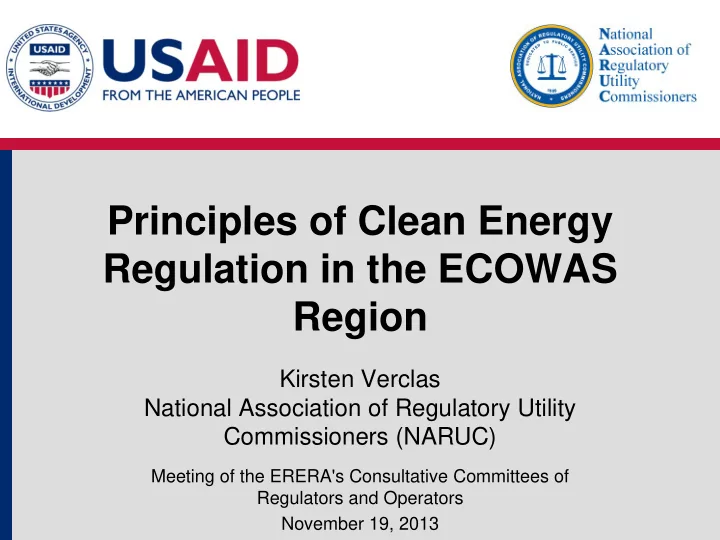

Principles of Clean Energy Regulation in the ECOWAS Region Kirsten Verclas National Association of Regulatory Utility Commissioners (NARUC) Meeting of the ERERA's Consultative Committees of Regulators and Operators November 19, 2013
Outline of Presentation • NARUC and NARUC’s International Department • NARUC’s past and ongoing work in West Africa • The Principles of Clean Energy Regulation 2
Who is NARUC? • The National Association of Regulatory Utility Commissioners (NARUC) – quasi-governmental, nonprofit organization – founded in 1889 • Membership – State Utility Regulatory Commissions in 50 U.S. States & Territories – Associate Members in over 20 other countries • What our members regulate – Electricity, natural gas, telecommunications, and water utilities. 3
NARUC International • In late 1990s, NARUC expanded its outlook beyond the U.S. to promote a better understanding of the complex issues that public utility regulators encounter all over the world. • Format of NARUC’s International Work: Bilateral Partnerships Technical Workshops Policy/Dialogue Forums Formal Trainings Internships Study Tours 4
NARUC’s Work in West Africa • Ongoing: West Africa Regional Regulatory Partnership WAGPA/ERERA/ECREEE NARUC/Nigerian Electricity Regulatory Commission (NERC) Regulatory Partnership Regulating Clean Energy: An International Partnership Program The Gambia • Past: PURA Staff and NARUC Experts Ohio-Ghana Regulatory Partnership 5
Black Sea Principles Renewable Energy Handbook • Guide for regulatory and • Review of best practices policy decision makers in in renewable energy the Black Sea Region around the world (with selected case studies) • Inventory of fundamental assumptions, mechanisms, tools, best practices, and national experiences in the field of renewable energy 6
Principles of Clean Energy Regulation • Drafted by consultant, enriched by outcomes of two technical workshops (Praia, Cape Verde, in May 2013 and Accra, Ghana, in October 2013) • Seeks to complement ECOWAS regional work – Implementation of SE4ALL in the region – ECOWAS Renewable Energy Policy and its national implementation • Practical guide to facilitate integration of clean modern energy practices into evolving traditional energy markets • Combines NARUC’s international experiences in renewable energy policy and regulation with specific case studies coming from selected ECOWAS countries 7 .
Structure of the Principles Key Principles Renewable Energy in ECOWAS Countries Economic Incentives for Renewable Energy Technical Integration of Renewable Energy Consultation Process and Impact Assessment Renewable Energy Markets and Harmonization 8
Key Principles – Policy Environment • Investment in energy today will strongly determine tomorrow’s electricity market • Support for renewable energy a national economic and energy policy objective • Coordination among regulator, relevant ministries, and system operators is a precondition for an effective renewable energy market • A clear identification of the competent body for the management of each regulation/legislation is necessary • Policies/regulations should give all players all necessary information for market analysis and assumption (present and future) 9
Key Principles – Economic Regulation • At cost parity, renewables should be preferred to fossil fuel energy sources • When renewables need economic support to develop, incentives have to be balanced with other national priorities • Development of renewable capacity is achieved by the commissioning of both small and large power plants • Incentives such as PPAs, feed-in tariff, Construction of a Wind Farm in The Gambia net-metering, etc. to mitigate risk for private investors 10
Regulatory Key Principles – Technical Connections • Existing transmission network was mainly built for dispatching of electricity generated by fossil fuel sources • Transparent grid code with specific provisions for renewable energy connection an important piece of regulation • Connection rules have to be defined in order to prevent discriminatory practice by the incumbent • Preferable to grant unconstrained access to renewables in beginning (as long as there is no evident system security risk) 11
Key Principles for Harmonization • Regional energy markets have advantages (technical, economic and policy) • The development of renewable energy can be tool for faster integration of ECOWAS energy markets • Lack of harmonization should not prevent implementation of renewable energy policy on national level 12
Conclusion • Support for regulatory agencies and policy makers • Inventory of fundamental assumptions, tools, best practices, and national experiences on key issues in the field of clean energy • Open process of updates as document stays with ERERA 13
Resources • NARUC Website: www.naruc.org • Renewable Energy Handbook: www.naruc.org/USAID/REHandboo k • Black Sea Principles: http://www.naruc.org/International/Renewable%20Pri nciples.pdf • NARUC Library: http://www.naruc.org/International/default.cfm?page= 5 14
Thank you for your attention! Merci pour votre attention! Kirsten Verclas Program Officer, International Programs NARUC kverclas@naruc.org 15
Recommend
More recommend